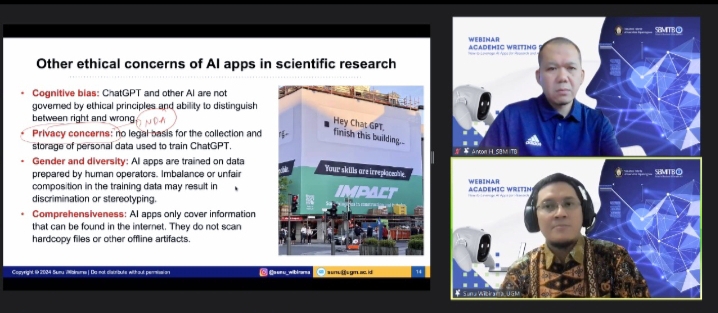Artificial Intelligence (AI) can be utilized for academic writing and research. However, the challenge lies in ensuring its application does not compromise scientific principles.
Dr. Eng. Ir. Sunu Wibirama, S.T., M.Eng., a lecturer from the Faculty of Electrical Engineering and Information Technology at Gadjah Mada University, highlighted the benefits and challenges of using AI in research during a seminar jointly organized by the SBM ITB, and the Faculty of Electrical Engineering and Information Technology, Gadjah Mada University. The seminar was held online and offline at the Freeport SBM ITB Building (8/8).
According to Sunu, AI is a research field involving a series of activities related to automatic decision-making. This process includes learning and self-correction by computers. Generative AI, in particular, utilizes machine learning algorithms to create original content, including images, videos, text, and audio.
Sunu explained that AI can assist in various aspects of research, such as planning research designs, recommending data sources, collecting and processing data, conducting data analysis according to research objectives, and enhancing the quality of academic writing. AI is especially beneficial for researchers who are experts in their fields.
However, AI’s results need to be validated. Since AI is not ethically accountable for scientific outcomes, it should not be credited as a co-author in research reports.
Sunu also raised ethical concerns regarding the use of AI in scientific research. He pointed out that AI applications may lack cognitive depth as ethical principles in research and academic writing do not govern them. There are also privacy concerns due to the lack of legal frameworks governing the collection and storage of personal data. Additionally, issues related to diversity and gender may arise if AI is not trained on datasets that adequately represent various populations. Furthermore, AI applications often rely on information accessible via the internet, which may not always be comprehensive.
Sunu noted that case studies have explored the use of AI in academic research, particularly in data analysis. The accuracy of AI in data analysis is often comparable to manual methods.
AI can also be used for gap analysis in research. However, applying the STEAM principle (Science, Technology, Engineering, Arts, and Mathematics) is necessary to ensure accurate and optimal results.
Generative AI offers opportunities to enhance the quality of research and academic writing. Nevertheless, researchers must consider ethical issues and legal regulations before using AI-based applications. While AI can assist with writing recommendations, researchers must validate the outputs to ensure the research findings are presented accurately and effectively.





